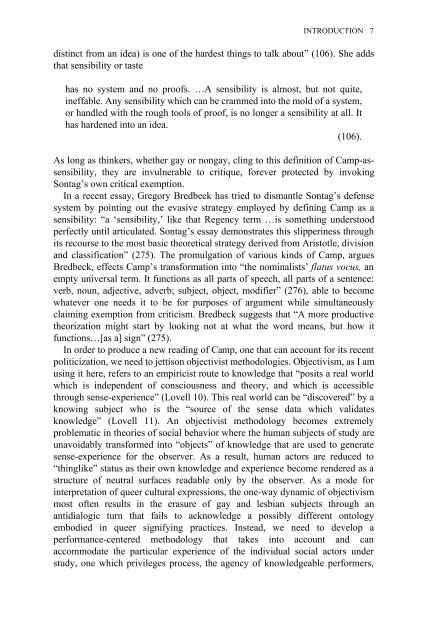Edited by Moe Meyer - Get a Free Blog
Edited by Moe Meyer - Get a Free Blog
Edited by Moe Meyer - Get a Free Blog
Create successful ePaper yourself
Turn your PDF publications into a flip-book with our unique Google optimized e-Paper software.
INTRODUCTION 7<br />
distinct from an idea) is one of the hardest things to talk about” (106). She adds<br />
that sensibility or taste<br />
has no system and no proofs. …A sensibility is almost, but not quite,<br />
ineffable. Any sensibility which can be crammed into the mold of a system,<br />
or handled with the rough tools of proof, is no longer a sensibility at all. It<br />
has hardened into an idea.<br />
(106).<br />
As long as thinkers, whether gay or nongay, cling to this definition of Camp-assensibility,<br />
they are invulnerable to critique, forever protected <strong>by</strong> invoking<br />
Sontag’s own critical exemption.<br />
In a recent essay, Gregory Bredbeck has tried to dismantle Sontag’s defense<br />
system <strong>by</strong> pointing out the evasive strategy employed <strong>by</strong> defining Camp as a<br />
sensibility: “a ‘sensibility,’ like that Regency term …is something understood<br />
perfectly until articulated. Sontag’s essay demonstrates this slipperiness through<br />
its recourse to the most basic theoretical strategy derived from Aristotle, division<br />
and classification” (275). The promulgation of various kinds of Camp, argues<br />
Bredbeck, effects Camp’s transformation into “the nominalists’ flatus vocus, an<br />
empty universal term. It functions as all parts of speech, all parts of a sentence:<br />
verb, noun, adjective, adverb; subject, object, modifier” (276), able to become<br />
whatever one needs it to be for purposes of argument while simultaneously<br />
claiming exemption from criticism. Bredbeck suggests that “A more productive<br />
theorization might start <strong>by</strong> looking not at what the word means, but how it<br />
functions…[as a] sign” (275).<br />
In order to produce a new reading of Camp, one that can account for its recent<br />
politicization, we need to jettison objectivist methodologies. Objectivism, as I am<br />
using it here, refers to an empiricist route to knowledge that “posits a real world<br />
which is independent of consciousness and theory, and which is accessible<br />
through sense-experience” (Lovell 10). This real world can be “discovered” <strong>by</strong> a<br />
knowing subject who is the “source of the sense data which validates<br />
knowledge” (Lovell 11). An objectivist methodology becomes extremely<br />
problematic in theories of social behavior where the human subjects of study are<br />
unavoidably transformed into “objects” of knowledge that are used to generate<br />
sense-experience for the observer. As a result, human actors are reduced to<br />
“thinglike” status as their own knowledge and experience become rendered as a<br />
structure of neutral surfaces readable only <strong>by</strong> the observer. As a mode for<br />
interpretation of queer cultural expressions, the one-way dynamic of objectivism<br />
most often results in the erasure of gay and lesbian subjects through an<br />
antidialogic turn that fails to acknowledge a possibly different ontology<br />
embodied in queer signifying practices. Instead, we need to develop a<br />
performance-centered methodology that takes into account and can<br />
accommodate the particular experience of the individual social actors under<br />
study, one which privileges process, the agency of knowledgeable performers,


